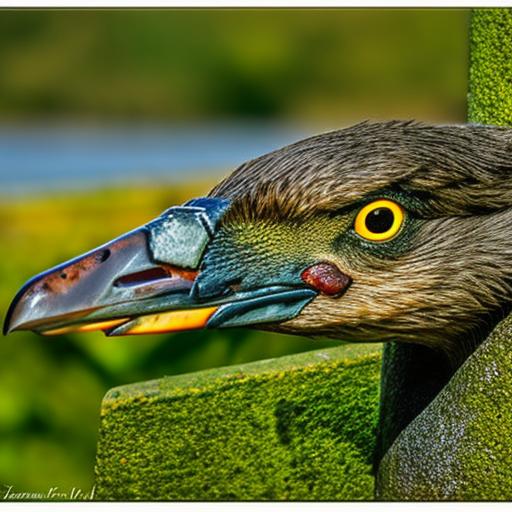Geese can be a beautiful sight to behold, with their graceful flight and elegant presence. However, when they invade your yard, they can quickly become a nuisance. Geese are known for their voracious appetites and messy droppings, which can damage your lawn and pose health risks. Finding a solution to keep geese out of your yard is important not only for the aesthetics of your property but also for the well-being of your family and pets.
Key Takeaways
- Geese can be a problem in your yard, causing damage and leaving droppings.
- Choosing the right fence is important for keeping geese out.
- Factors to consider when selecting a fence include height, material, and visibility.
- Physical barriers like fences are effective in deterring geese.
- The best types of fences for keeping geese out include chain link, welded wire, and electric fences.
The importance of choosing the right fence
A fence can be an effective solution for keeping geese out of your yard. It creates a physical barrier that prevents geese from entering your property and causing damage. However, it is crucial to choose the right type of fence to ensure its effectiveness. A poorly chosen fence may not deter geese and could end up being a waste of time and money.
Factors to consider when selecting a fence
When selecting a fence for geese control, there are several factors to consider. First and foremost, the height of the fence is crucial. Geese are large birds that can fly, so the fence needs to be tall enough to prevent them from flying over it. A fence that is at least 4 feet tall is recommended to deter geese effectively.
The material of the fence is another important factor to consider. Geese have strong beaks and can cause damage to certain types of fences. It is best to choose a material that is sturdy and resistant to damage, such as chain link or welded wire.
Visibility is also an important factor when selecting a fence for geese control. Geese are more likely to approach a fence if they can see through it, as they feel safer when they have a clear view of their surroundings. A fence with small gaps or openings, such as plastic mesh, may be more effective in deterring geese than a solid fence.
The advantages of using a physical barrier
Physical barriers, such as fences, are highly effective for geese control. They create a clear boundary that geese are less likely to cross. Unlike other methods, such as repellents, physical barriers provide a long-term solution that does not require constant reapplication.
Physical barriers work by creating an obstacle that geese cannot easily overcome. When faced with a fence, geese are less likely to attempt to enter your yard and will seek out other areas for feeding and nesting. This not only protects your property but also helps to preserve the natural habitats of geese.
Types of fences that work best
Several types of fences work well for geese control. Chain link fences are a popular choice due to their durability and visibility. The small gaps in the chain link allow geese to see through the fence, making them less likely to approach it.
Welded wire fences are another effective option. They are made from thick, sturdy wire that can withstand the pecking and prodding of geese. Welded wire fences can be customized to fit the specific needs of your property and can be installed at varying heights to deter geese effectively.
Plastic mesh fences are also a viable option for geese control. They are lightweight, easy to install, and provide good visibility. Plastic mesh fences can be an affordable choice for those on a budget, while still offering effective protection against geese.
The benefits of electric fences

Electric fences can be an excellent choice for geese control. They provide a strong deterrent without causing harm to the geese or other animals. Electric fences work by delivering a mild electric shock when touched, which teaches geese to avoid the area.
Electric fences are highly effective because they create both a physical and psychological barrier for geese. The shock they receive when attempting to cross the fence acts as a negative reinforcement, conditioning them to associate the fence with discomfort. Over time, geese learn to avoid the area altogether, making electric fences a long-term solution for geese control.
Tips for installing a fence
When installing a fence for geese control, there are several important considerations to keep in mind. First, the placement of the fence is crucial. It should be installed around the perimeter of your property, creating a clear boundary that geese cannot easily cross. It is also important to ensure that the fence is securely anchored to the ground to prevent geese from pushing or lifting it.
Additionally, it may be beneficial to install a secondary barrier, such as a low fence or landscaping features, to further deter geese. This can create an additional obstacle that makes it more difficult for geese to access your property.
Maintenance and upkeep
Once your fence is installed, it is important to maintain it properly to ensure its effectiveness. Regular inspections should be conducted to check for any damage or wear and tear. Any repairs or replacements should be made promptly to prevent geese from finding weak spots in the fence.
Keeping the area around the fence clear of debris and vegetation is also important. Geese are resourceful creatures and can use nearby objects to gain access to your property. Regular maintenance and upkeep of your fence will help ensure its longevity and effectiveness in keeping geese out.
Other methods for managing geese
While fences are an effective solution for geese control, there are other methods that can be used in conjunction with or as an alternative to fencing. Repellents can be applied to areas where geese are likely to feed or nest, creating an unpleasant environment that deters them from staying.
Habitat modification is another method that can be used to manage geese. By altering the landscape of your property, you can make it less attractive to geese. This can include removing sources of food and water, as well as creating barriers, such as hedges or shrubs, that make it difficult for geese to access your yard.
In conclusion, finding a solution for geese in your yard is important for the well-being of your property and family. A fence can be an effective tool for geese control, but it is crucial to choose the right type of fence. Factors such as height, material, and visibility should be considered when selecting a fence.
Physical barriers, such as fences, are highly effective for geese control and provide a long-term solution. Types of fences that work best include chain link, welded wire, and plastic mesh. Electric fences can also be an excellent choice, providing a strong deterrent without causing harm to geese.
Proper installation, maintenance, and upkeep of your fence are important to ensure its effectiveness. Other methods, such as repellents and habitat modification, can also be used in conjunction with fencing or as an alternative. By taking the necessary steps to manage geese in your yard, you can enjoy a beautiful and goose-free property.
If you’re looking for the best fence to keep geese out, you might also be interested in learning about how to care for goslings. Geese can be quite territorial and protective of their young, so it’s important to have the right knowledge and resources to ensure their well-being. Poultry Wizard offers a comprehensive guide on how to care for goslings, covering everything from feeding and housing to health and safety. To create a secure environment for your geese, it’s essential to have a reliable fence in place. For more information on the best fencing options, check out this informative article on Poultry Wizard.
FAQs
What is the best fence to keep geese out?
The best fence to keep geese out is a fence that is at least 4 feet tall and made of a material that geese cannot easily climb or fly over.
What materials are best for a goose-proof fence?
Materials that are best for a goose-proof fence include chain link, welded wire, and vinyl-coated wire mesh. These materials are difficult for geese to climb and are too high for them to fly over.
How high should a fence be to keep geese out?
A fence to keep geese out should be at least 4 feet tall. This height is too high for geese to easily jump over and too low for them to fly over.
What other measures can be taken to keep geese out?
Other measures that can be taken to keep geese out include using decoys, applying goose repellent, and removing food sources. Additionally, planting tall grasses or shrubs around the perimeter of the property can create a natural barrier that geese are less likely to cross.
Can electric fences be used to keep geese out?
Electric fences can be used to keep geese out, but they should be used with caution. Electric fences can be dangerous to humans and other animals, and they may not be effective in deterring geese if they are not properly installed and maintained.
Meet Walter, the feathered-friend fanatic of Florida! Nestled in the sunshine state, Walter struts through life with his feathered companions, clucking his way to happiness. With a coop that’s fancier than a five-star hotel, he’s the Don Juan of the chicken world. When he’s not teaching his hens to do the cha-cha, you’ll find him in a heated debate with his prized rooster, Sir Clucks-a-Lot. Walter’s poultry passion is no yolk; he’s the sunny-side-up guy you never knew you needed in your flock of friends!







